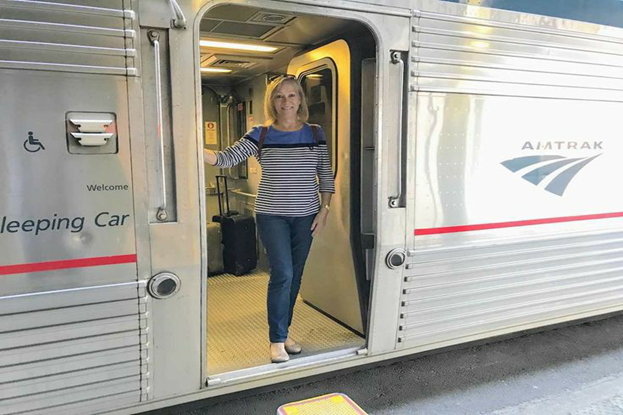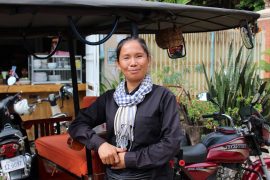Staci Montori, an integrative medical practitioner, living in Boston, was surprised when she found out the contribution her travelling was having on the climate. She often flew to visit her family in California. But after consulting a carbon footprint calculator, she promised to go flight-free last year.
“I thought I was so green, but then I realized I’m flying,” she says. “And that’s the biggest chunk of my carbon footprint. I had a little bit of a panic moment. I thought ‘How am I going to see my family if I’m not going to fly?” However, after some investigation, she found a month-long rail pass that allowed her and her daughter to affordably move across the country from Boston to San Francisco. Their trip included two weeks in California, along with stops along the way in Chicago and Colorado.
“It was actually so much fun,” she says. “It went from feeling like a big sacrifice to wow; this is a really exciting way to travel. And I slowed down; I got a lot of quality downtime with my daughter.” A connection to place, a better adventurous experience, being treated adequately like a human, affording to sleep in a bed and eat in a restaurant; and many more are some reasons slow travel beats flying. Oh! Lest I forget, “you can take your own campaign.”
Asides from those, travelling is more favourable for the climate.
“Generally, trains and coaches are the lowest carbon means of travel, much lower than flying and cars,” says Milena Buchs, an expert in sustainability, economics and low carbon transitions at the University of Leeds.
A travel editor and author of a recently published flight-free memoir, Zero Altitude: How I learned to fly less and travel more, Helen Coffey, together with a pair of sustainability and travels aficionados talked about replacing travelling by plane with train and the need to take a break on aviation as a virtual event.
Mark Smith, popularly known as the Man in Seat 61, was also available to give his unbiased expertise on travelling the globe by rail and boat. At the same time, Anna Hughes, the director of the Flight Free UK campaign that encourages Brits to quit flights for a year – stated all the latest stats on why regular flying isn’t friendly with our carbon targets during this period of the various climate crisis.
The team disseminated top advice for staying grounded while roaming far and wide, from using decent sleeper trains to conserve time to looking closer to home and embracing domestic breaks. “You have to make the journey part of the holiday,” was often chorused, along with Mark’s advice to book before time to get the best bargain on trains.
The viewers asked questions such as – why flying so frequently beats rail travel in terms of price. Smith highlighted the problem of making trains competitive when you’re” daisy-chaining” – getting multiple train legs to get to a destination compared to being able to fly directly. Anna emphasized aviation’s easy ride, with no VAT or tax on Kerosene (jet fuel).
As a way to tackle the price disparity, Helen highlighted the need for a frequent incremental tax, which ensures the wealthiest pay more, the more they fly -and this would naturally make them reduce the number of lights they take, consequently. The panel also gave their recommendations for weekend travel and short breaks, including the Scottish Highlands on the Caledonian Sleeper, the Netherlands by overnight ferry, and even Milan, Turin or Barcelona, all accessible by train within a day.
If you don’t have to fly, consider using the train or even driving. When choosing a destination for vacation, consider places closer to home or areas where you could rather travel by train than fly. When we do this, we do it not just for the climate but for ourselves. The environment deserves better, and so do you!





Comments are closed.